
|
IN MEMORY OF LIL GREENWOOD
"I'll Go"/"I'm Crying"
by Lil Greenwood (And The Lamplighters)
on Federal 12158
released in 1953
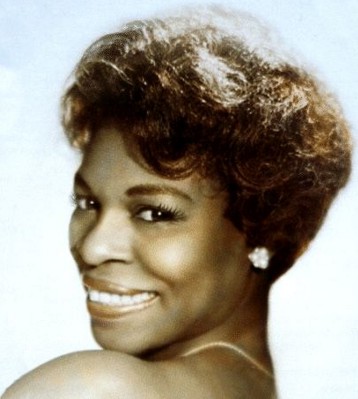
|

|
IN MEMORY OF LIL GREENWOOD
"I'll Go"/"I'm Crying"
by Lil Greenwood (And The Lamplighters)
on Federal 12158
released in 1953

|
(NOTE: The following biography is copyright by Todd Baptista and used here with his permission.)
JAZZ, R&B VOCALIST, LIL GREENWOOD, DIES AT 87
Todd Baptista © 2011
Funeral services were held July 23 in Mobile, Alabama for jazz and R&B vocalist Lil Greenwood, a veteran of the Duke Ellington Orchestra, who died early Tuesday, July 19, 2011 after a period of declining health. She was 87. An engaging and powerful contralto of African-American and Native-American descent, Lillian B. Greenwood was born in Mobile on November 18, 1923 and began singing as a soloist and in gospel choirs as a youngster. Winning a 1947 Harlem, New York Apollo Theater amateur contest with a rendition of "I'm Gonna Sit Right Down And Write Myself A Letter", she moved to California and was discovered by bandleader Roy Milton in 1950. Recording for Specialty Records, Roy Milton's Solid Senders had already racked up eight of their eventual 19 top 10 R&B chart hits when Milton brought Greenwood aboard. "I was living in Oakland when Roy Milton found me," she remembered in a 2002 interview. "Camille Howard had been in the band, and she was a great piano player, a great entertainer, but an average vocalist. She left for a while to form her own trio, and I came into the orchestra as a vocalist."
Almost immediately, Greenwood found herself in the recording studio with Milton's band. That spring, "Heart Full Of Pain", issued on Modern under her name, made some noise in the San Francisco area. Sides credited to Milton's Solid Senders, meanwhile, still appeared on Specialty. During the fall of 1950, the troupe logged an astounding 50,000 miles on a cost-to-coast tour. "There isn't a city or a state in the United States that I haven't seen," she recalled of her early days. "We went to every little place in Texas, Mississippi, Oklahoma and Arkansas, around New York, New Jersey, and over to the Carolinas."
A pair of follow-up releases, "Ain't Gonna Cry" and "Dissatisfied Blues", appeared on Modern in the summer and fall. "Sitting And Wondering", Lil's final Modern disc, was issued in April 1951. That October, she signed with Specialty. "I was still with the Milton band," she explained. "We made 'Love Will Make You A Slave' (February, 1952), and it came out under my name." Ben Waller, the band’s booking agent, eventually introduced Greenwood to producer Ralph Bass. "At the time (spring, 1952), I wasn't under contract to any label. He wanted to have me record for Federal like he had Little Esther. She was popular and they wanted to do the same thing (with me)."
Paired with the Four Jacks, Greenwood was given a take-off on Wynonie Harris' 1949 hit, "Grandma Plays The Numbers". "What they did was just rewrite it to fit a female lead, ‘Grandpa Can Boogie Too’." With the Four Jacks, Lil also waxed the soulful, gospel-flavored ballad, "Never Again", which she had written with bassist Mario Delagarde. "I had begun writing songs. Since I had grown up singing in gospel choirs, most of the stuff I have written, and my performances, always have a gospel feel, a strong religious tie. Mario was fantastic. I'd go to his house and work on songs with him and he'd help me put together the music." "Monday Morning Blues" paired Greenwood with Little Willie Littlefield and the Four Jacks.
"When I first starting learning, Roy Milton taught me the blues. I worked the chitlin' circuit for a long time with a lot of the great blues singers, and I picked up things from them, too." Early in his career, Ray Charles, for whom she later recorded at Tangerine Records, was a frequent touring companion. Likewise, female singers Mahalia Jackson, Sarah Vaughan, "Big Mama" Thornton, and Mickey Champion were all friends and influences. The following year, Bass paired her with the Lamplighters for "I'll Go"/"I'm Crying" and "Mercy Me"/"All Is Forgiven", all strong efforts issued under Lil's name in 1953-54.
After Federal, Greenwood found work in nightclubs in the Oakland-San Francisco era. During a 1957 appearance at the Purple Onion in San Francisco, she was discovered by composer-bandleader Duke Ellington, who called her a week later with a job offer. In a 1960 interview with Ebony, Ellington described her as a mixture of Marian Anderson, Ella Fitzgerald, Dinah Washington, and Mahalia Jackson. Lil’s signature recording with the Ellington band was “Walkin’ and Singin’ The Blues”. "I got to (Billy Strayhorn’s) apartment about five in the afternoon. He and Duke had already taken the song I had written to open and close my shows, 'Walkin' and Singin' the Blues', and added more lyrics and verses.” That night, Greenwood was invited to record the tune in an after hours session. “Suddenly Duke pointed at me and said, ‘Okay, that's where you come in. We did just one take and Duke said it was a wrap. That night Duke nicknamed me, 'One Take Lil'."
“Walkin’ and Singin’ the Blues” was released to critical acclaim, and for the next several years, Greenwood traveled worldwide, recording and performing with the band at venues ranging from the Apollo Theatre to the Newport Jazz Festival. In July, 1958, she was featured on the band's recordings of "Bill Bailey, Won't You Please Come Home" and "I Got It Bad (And That Ain't Good)". "Duke Ellington taught me jazz," she proclaimed. On October 9, 1959, her performance with the band at Zurich, Switzerland's Kongresshaus was captured in the concert film, Duke Ellington In Der Schweiz. Two additional vocal sides, "I Love My Lovin' Lover", and "My Man Sends Me", were recorded in August of 1963.
While living in California, Lil began studying acting at the Inner City Cultural Center and subsequently appeared in episodes of the network television shows The Jeffersons, Good Times, and Grady during the 1970s. She made guest appearances on The Tonight Show with Johnny Carson and The Flip Wilson Show and landed small parts in the motion pictures My Father's House (1975) and The River Niger (1976).
Greenwood eventually returned to Prichard, Alabama to care for a younger sister. In her mid-80s, she still possessed a strong voice and frequently ventured out to blues festivals throughout the South. "Wherever and whenever they want me, I go if I can," she reported. Around town, she was noted as much for her singing as for her 1965 Ford Galaxy station wagon with its antique plates.
In August of 2002, she was honored with induction into the Gulf Coast Ethnic and Heritage Festival's Hall of Fame in Mobile. "I'm still trying to keep myself going," Lil explained. "The blessed part of it is the Lord has been good to me. I'm meticulous with my voice. I don't do any smoking or drinking, and I was never into the all-night parties."
In the New Millennium, Greenwood recorded a live CD featuring several originals including "Crazy About Your Love" and "That’s The Truth", along with a pair of Ellington era classics, "Hello Little Boy" and "Walkin' and Singin' The Blues". Collaborating with composer David Amram and producer Buz Rummel, Lil recorded her final album, Back To My Roots, in 2006. Her classic R&B sides were compiled on CD by Ace Records UK in 2002.
Ms. Greenwood suffered a stroke in the fall of 2010 and had been receiving hospice care for the last six weeks of her life. Two days before her death, friends and fans gathered at the Alabama School of Mathematics and Science for a tribute concert honoring her legacy. She was laid to rest in Mobile’s historic 150-acre Catholic Cemetery. The renewed interest Greenwood enjoyed in her final years “meant a huge amount,” Rummel told the Mobile Press-Register. “It kept her going much more so than she might have done otherwise. That attention was really great for her.”
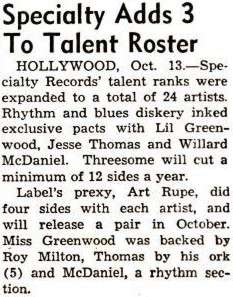
| 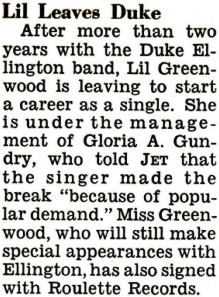
|
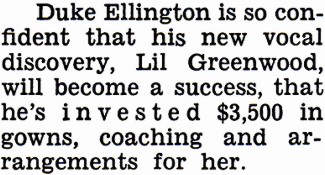
|
Above: Trade magazine clippings from (Top Left) 10/20/51 (Billboard), (Bottom) 8/14/58 (Jet) and (Top Right) 12/15/60 (Jet).
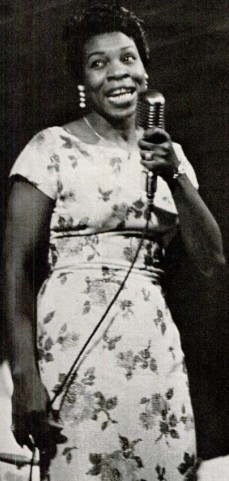
| 
| 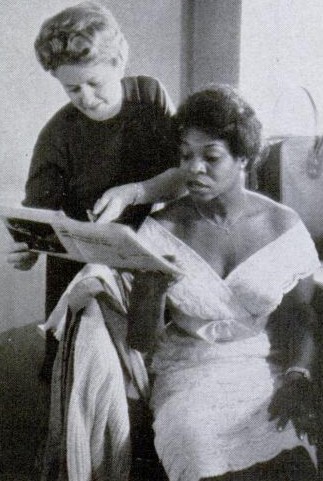
|
Above: Photos of Lil Greenwood from the April 1960 issue of Ebony Magazine.
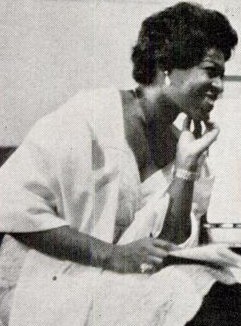
| 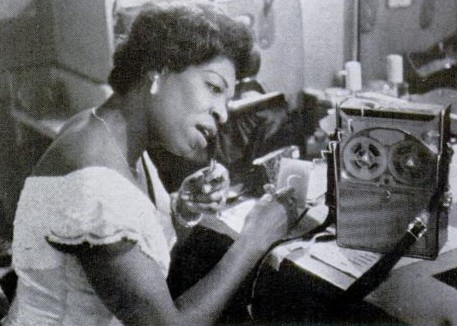
|
Above: More photos of Lil Greenwood from the April 1960 issue of Ebony Magazine.
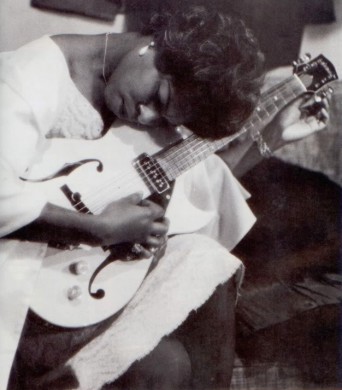
| 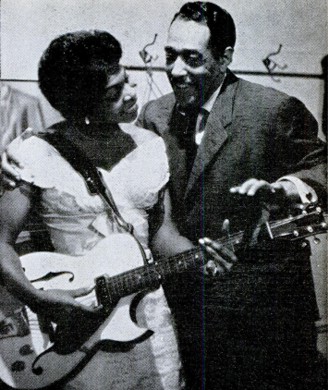
|
Above: Photos of Lil Greenwood from the 4/14/60 issue of Jet Magazine. Duke Ellington is in photo above right.
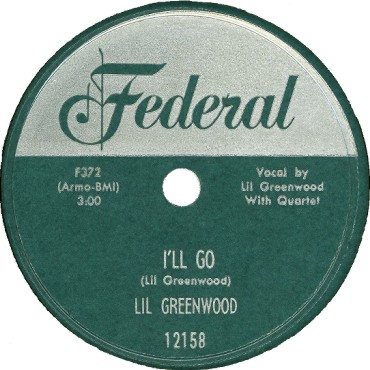
|
Above: Label image of Federal 12158 released in November 1953. This is the first of two records that The Lamplighters backed Lil Greenwood on Federal (1953-54). She was also backed by The Four Jacks on two Federal releases (1952). The Lamplighters also backed Jimmy Witherspoon on two Federal releases (1953-54).Lil composed the songs on both sides of this record, as she did for many others.
Listen to this week's selections by Lil Greenwood (And The Lamplighters) on Federal 12158 from 1953: [Audio restoration by Dave Saviet.]
[To download audio files, right-click on link and then select "Save (Link) Target As..."]
A. Stream RealAudio (DO NOT USE...LISTEN USING DOWNLOAD REALAUDIO)...
1. I'll Go
2. I'm Crying
BOTH played in sequenceB. Download RealAudio...
1. I'll Go
2. I'm CryingC. Stream/Download Media Player...
1. I'll Go
2. I'm Crying
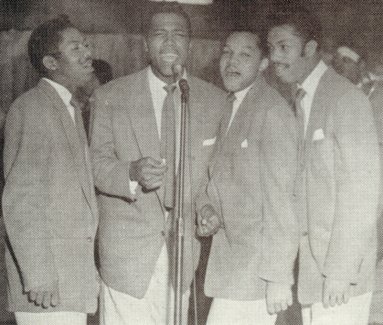
The Lamplighters
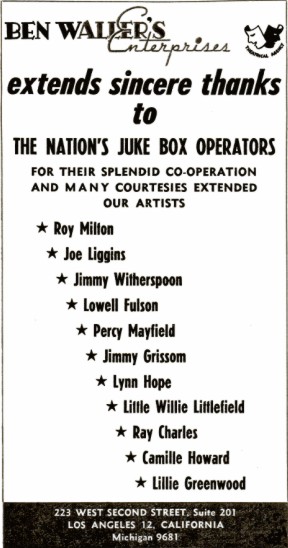
Clipping 3/17/51

This site is non-commercial. All information displayed is provided to further the general public's knowledge of RnB vocal group harmony.